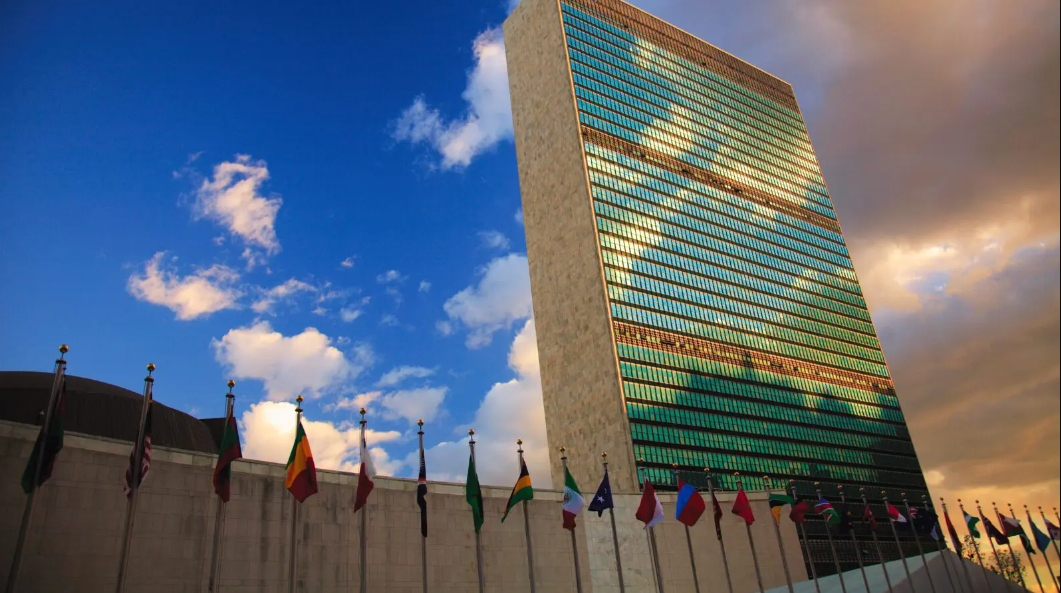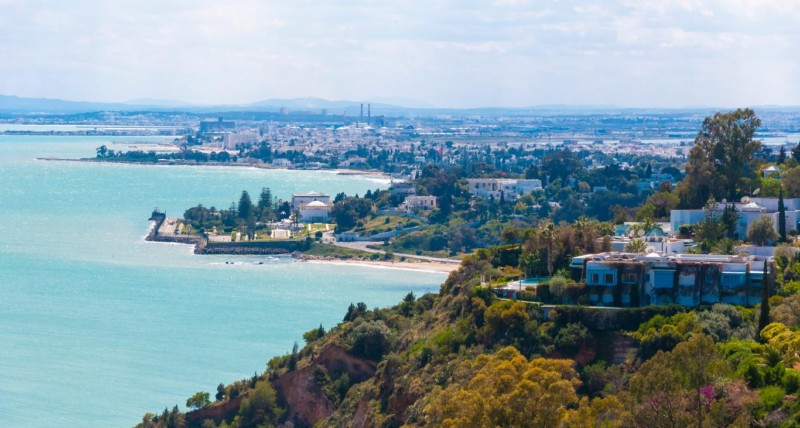What did West African countries say and defend during the latest UN General Assembly? François Backman, a member of the Sub-Saharan Africa Observatory, analyzes the content of speeches by various heads of state and government from several West African countries, particularly those that have recently experienced a military coup.
The 69th UN General Assembly took place in New York from September 22 to 27, with the theme « Leave no one behind: working together for peace, sustainable development, and human dignity for present and future generations. » This annual event is an opportunity for each member state to speak before its peers, defend its actions and vision, and position itself within the UN framework. At the same time, much of the action occurs behind the scenes, with lobbying happening far from the halls of First Avenue. What did West African countries say and defend? What did they emphasize? What positions did the military regimes in Guinea, and especially the members of the Sahel States Alliance (Burkina Faso, Mali, and Niger), take? These are some of the questions this note aims to address at a time when West Africa does not seem to be in particularly strong shape.
Between Major Issues and Self-Advocacy
While each speaker « often preaches for their own parish, » the statements from West African states overlap on several topics: the weight of debt, the continent’s notably insufficient representation in major decision-making bodies, both UN and non-UN, climate change and its consequences. Some also call for consideration of the risk of digital divides, particularly in artificial intelligence (AI), warning that Africa, especially its Francophone part, must not be left behind. Ivorian Vice-President Tiémoko Meyliet Koné, for example, highlights the threat of « digital downgrading for part of humanity. » Finally, when discussing the achievement of the 2030 Sustainable Development Goals (SDGs), the famous « SDGs, » speakers note that these goals are nearly impossible to attain. Optimism seems to be in short supply.
Issues related to youth, education, and employability are highlighted, as seen in the speech of Nigerian Vice-President Kashim Shettima, who stresses their importance. This is especially true in Nigeria, where the youth seem deeply disillusioned: only 6% of 18-24-year-olds are confident about the country’s future, and more than eight out of ten wish to emigrate.
In several speeches, there is a more or less implicit criticism of aid mechanisms that come « from above, » with conditions that are somewhat disconnected from African realities. Togolese President Faure Gnassingbé, for example, mentions that « universal solutions imposed from the outside [can] have some virtues, but [they] have only partially proven their worth. » As for Bassirou Diomaye Faye, the young Senegalese president elected in April 2024 on a sovereignist platform, he considers it « necessary to break with any attempt to impose unilateral civilizational norms. » He adds that « no nation should impose its practices or values on others as universal norms. Respect for differences is the foundation of peace and stability in the world. » He resonates completely with rising themes in Africa, criticizing a West that imposes its model, particularly on moral issues. The President of Senegal seems to be very much in tune with wide sectors of West African opinion, if such opinion can be measured.
Some leaders, apparently influenced by the recent China-Africa Forum in early September 2024, call for « respect for the One China principle, » like Gambian President Adama Barrow. He also attempts to restore the image of a country that had been vilified following a proposed law, which was ultimately rejected, to lift the ban on female genital mutilation, in place since 2015. The Gambian head of state insists that he will continue to guarantee the protection of women and girls. Others, finally, tend to self-promote, such as Guinea-Bissau President Umaro Sissoco Embaló, who boasts of his efforts to revive the African Leaders Malaria Alliance, a continental organization fighting malaria and still seeking funding.
The Sahel at the Heart of Concerns
Security issues and recent military coups (Guinea, Mali, Burkina Faso, Niger) are, of course, discussed, particularly among neighboring countries. Terrorism knows no borders, and the northern areas of Togo, Benin, and to a lesser extent Ghana and Ivory Coast, are porous and have already experienced attacks and incidents, not to mention Nigeria, which is also facing this issue.
According to Ghanaian President Nana Akufo-Addo, who, as usual, delivers a brief and clear speech, terrorist atrocities demonstrate the fragility of West African democracies. More directly, the Ivorian vice president states, rightly in our view, that « beyond the Sahel, it is now all of West Africa that is threatened with collapse. »
Each state shares its security concerns on this topic while claiming to take the appropriate measures, playing the role of good students. Thus, the Nigerian representative refers to the April 2024 summit, which resulted in the Abuja Declaration, involving twenty-nine countries and, according to him, offering real solutions. As for his Ivorian counterpart, he highlights his country’s efforts in terms of training and regional cooperation through the International Academy for the Fight Against Terrorism located near Abidjan.
Things are not going well in the Sahel, « a theater of growing tensions, exacerbated by decisions made without the consent of Africans, » according to Beninese President Patrice Talon. « Tragedy, » says the young Senegalese president, who rightly notes, « We cannot accept the Sahel becoming the stage for rivalries between foreign powers, whose conflicts only worsen the destabilization of the region. »
This is an understatement, as the region is more than ever the playground of external powers – China and Russia, of course, but also Turkey and Iran. While Turkey is selling drones to Mali, Burkina Faso, and Niger, Russia aims to sell not only weapons but also mercenaries and nuclear plants. Iran, struggling with harsh economic sanctions, has been trying for several years to establish a presence in the Sahel, particularly eyeing Niger’s uranium. That said, the Islamic Republic remains a minor player compared to its competitors, and despite a few contracts, it does not have the means to fulfill its ambitions. On the continental level, the Sahel is also the subject of Algerian-Moroccan rivalry, with Algeria having issues with Mali, as we will see further. As for the Kingdom of Morocco, in competition with Algiers in Niger, it remains ready to assert its leadership in the region, faithful to its long-standing African policy. Thus, Rabat has proposed to the three landlocked AES countries access to the Atlantic via the creation of appropriate infrastructure. Morocco has also donated a thermal power plant to Niger. It should be noted that in these three countries, only one person in five has access to electricity.
The AES (Burkina Faso, Mali, Niger): Siege Mentality Speeches
Let’s set aside the rather bland statement from Bah Oury, Guinea’s Prime Minister, whose country is trying to stay as far away as possible from the Sahel issue.
As for the statements from the three AES states, they align with the one made by Sergey Lavrov at the same forum, which is not surprising given the ties with Moscow. The indefatigable Russian Foreign Minister once again condemned the « Western minority, » following the Karaganov doctrine, which advocates the de-Westernization of the world and aims to position Russia as one of the leaders of the « Global South. » Their statements also align with the very sovereignist declarations from Turkey and China.
The Sahelian representatives stick to a classic line: our « valiant » armed forces are winning the war on terrorism, we are sovereign, and we fight against all neo-colonial powers secretly supporting armed groups – the well-known « hidden hand » narrative, repeated in varying degrees of subtlety.
Mali stands out in its speech form, which recalls the construction, structure, length (almost thirty minutes, like last year), expressions, and references of speeches from old African presidents at the start of the century. Colonel Abdoulaye Maiga, the vice prime minister, delivers a very old-school Francophone address under the guise of « rupturism. » Indeed, all the clichés and heavy-handedness of a « fatherly » speech are present: quotes from Hobbes and Amadou Hampâté Bâ, the obligatory yet banal Latin phrase, the Bambara proverb to sound African, emphatic expressions, and other grandiose formulations that undermine the impact and clarity of the message. It is filled with dates, repetitions, and contradictions, all punctuated in a military tone. Even some lines are copied directly from last year’s speech. The speechwriters for these colonels could certainly put in more effort… When form kills substance, beyond what one might think of the content.
As for the content, it focuses on promoting the work of Colonel Goïta, the leader of the Malian junta. Abdoulaye Maïga mentions the National Refoundation Conference and the National Education Program for Values, a vague guide launched last April to « revitalize Malian traditions » and « refound the nation, » alongside some limited Pan-Africanism praising the « brotherly peoples of Burkina Faso and Niger. » Like his counterparts, the vice prime minister discusses the July 6, 2024 Treaty that established the Sahel States Confederation, a text going beyond military and counter-terrorism issues, aiming to eventually create a federation between the three Sahelian states around three pillars: diplomacy, defense, and development. This is a replication of the French Development Agency’s triptych.
And enemies are named. Unable to build a state, one builds an identity against other states, a classic tactic. Attacks on the Economic Community of West African States (ECOWAS) « at the behest of imperialist and neo-colonial entities, » implicitly criticizing the actions of Ivorian President Alassane Ouattara and his Beninese counterpart Patrice Talon, are present. The same goes for the anti-French rhetoric. Nothing new here.
There is also criticism of « state sponsors » of terrorist groups, including Ukraine, accused of being behind the attack on a Malian military patrol in July 2024, after which Bamako broke diplomatic ties with Kiev. Next, Algeria becomes a target for Mali. Criticism of the northern neighbor—over 1,300 kilometers of shared borders—occupies nearly a sixth of Colonel Maiga’s speech. After various border incidents between the two countries, the Malian representative takes the opportunity to « drive the point home » regarding the 2015 Algiers agreements, which are dead and buried, and insinuates that the Algerian UN representative « provides shelter and sustenance to terrorists and renegades in disarray. » Mali is not an Algerian province, he adds, and « for every wrong word, we will react in kind; for every bullet fired at us, we will retaliate in kind. To the wise, too bad! »
The Algerian representative does not mention this issue, instead diplomatically highlighting the suffering of Sahelian countries due to political dysfunctions, the rising terrorist acts, and the lack of prospects for development.
For Niger, the Foreign Minister, Bakary Yaou Sangaré, taking the side of the « left-behind, » reaffirms his conviction: Niger, like other AES states, has nothing to expect from wealthy « privileged » nations. Sahelians, let us save ourselves and declare our common salvation—that is the line.
Slightly softer in his criticism of ECOWAS than his Malian counterpart, but directly attacking « certain Western powers that fund and arm terrorist groups to destabilize the country, » he condemns « subversive actions and the new strategy of recolonization openly pursued by France, which informs, trains, finances, and arms terrorist groups in the Sahel. » A familiar tune… He also calls for win-win partnerships with all countries that wish to collaborate.
Finally, on the Burkinabe side, for about twenty minutes, Foreign Minister Karamoko Jean-Marie Traoré sticks to similar themes. Freedom, dignity, and pride are the triptych underlying his address. It is worth noting that his speechwriters make no mention of the fortieth anniversary of Thomas Sankara’s « historic » speech at the same forum. The Pan-Africanists of the 21st century seem to have a short memory.
The Burkinabe leader, like all the other countries at this 79th Assembly, criticizes a « worn-out multilateralism. » As expected, he targets the « partisan and predatory actions of certain states that have positioned themselves as the masters of the world and made submission and exploitation of other states their foreign policy, » guiding and funding terrorist groups, implying France and Ukraine.
He also attacks « offices with dubious reputations and integrity, » and their « vast and virulent campaign of slander and stigmatization against our fighting forces, accusing them of human rights violations without producing any proof. » It is well known that in the Sahel or elsewhere, armies are exemplary and war is clean… The minister praises the « strategic and visionary » reforms of Captain Ibrahim Traoré, the leader of the junta. As proof, he adds, the Burkinabe state now controls 70% of its territory, compared to 40% two years ago. This remains to be proven, given the extreme fragility and nervousness of the regime.
The three AES speakers portray the Sahel as an Eldorado under siege from all sides, which, thanks to the actions of a Burkinabe captain, a Malian colonel, and a Nigerien general, supported by their populations, is heading in the right direction… With an eye on Russia and other powers such as China, Turkey, and Iran (all thanked in the AES representatives’ speeches), these are siege speeches that ultimately produce little in terms of security and offer almost nothing for the living conditions of populations suffering from the lack of essential services (electricity, health, food insecurity, education, etc.).
In Conclusion
From Dakar to Niamey, from Abidjan to Lagos, and through Accra or Freetown, what can we take away from these New York speeches – aside from those of the AES States – beyond their formality and « required step » nature?
First, there is a certain nervousness related to the evolving situation in the subregion, a nervousness not only due to the security context but also to potentially more explosive phenomena. The themes of « youth » and economic development are the most obvious. Then, there is a desire to propose « African solutions » to the continent’s problems, although this remains somewhat vague and, for now, unfortunately unfinished. And finally, a desire to have a more significant impact on global politico-economic regulatory systems.
If we look in the mirror at the speeches of major Western countries or large non-African Southern nations, we can see that, despite some discursive convergences, African voices still struggle to be truly heard. See you next September for the 80th Assembly.
Source: jean-jaures




